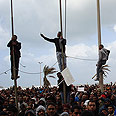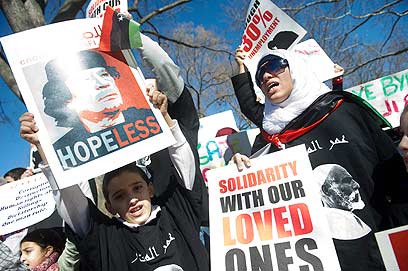
'42 years of lies.' Protest in Libya
צילום: a7fadhomar CC
Arab League demands end to Libya violence
Moussa backs protestors' demand for 'reform development and change'; UK summons Libyan ambassador to condemn use of deadly force by security forces. Al-Jazeera: 61 killed in latest protests in Tripoli
The head of the Arab League called for an end to violence in Libya on Monday, saying the demands of Arab people for change are legitimate.
Arab League Secretary General Amr Moussa said the bloodshed in Libya, where violent unrest has spread to the capital Tripoli, must stop, Egyptian state news agency MENA reported.
"The demands of the Arab peoples for reform, development and change are legitimate and ... the feelings of all the (Arab) nations are joined in this decisive moment in history," MENA cited Moussa as saying.
Britain's Foreign Office said on Monday it was summoning Libya's ambassador to condemn the use of lethal force against demonstrators.
Foreign Secretary William Hague said Britain was calling for an immediate end to the violence and the killing of protesters and a full investigation into the events in Benghazi, Libya's second city, and eastern Libya.
Dozens of people were reported killed in Tripoli overnight as anti-government protests reached the Libyan capital for the first time and the building where the country's parliament meets was ablaze on Monday.
One of Muammar Gaddafi's sons said the veteran leader would fight the popular revolt that has shaken his 40-year rule until "the last man standing".
Anti-government protesters rallied in Tripoli's streets, tribal leaders spoke out against Gaddafi, and army units defected to the opposition in a revolt that has cost the lives of more than 200 people.
Output at one of the country's oil fields was reported to have been stopped by a workers' strike and some European oil companies withdrew expatriate workers and suspended operations.
Al Jazeera television quoted medical sources as saying 61 people had been killed in the latest protests in Tripoli.

Anti-Gaddafi rally in Washington (Photo: AFP)
It said security forces were looting banks and other government institutions in Tripoli and protesters had broken into several police stations and trashed them.
The building where the General People's Congress, or parliament, meets when it is in session in Tripoli was on fire on Monday morning, a Reuters reporter said.
The eastern city of Benghazi, where the protests began last week after the arrest of a human rights lawyer and where scores of people have been killed by security forces, was said by some residents to be effectively in the hands of the protesters.
Gaddafi's son Saif al-Islam Gaddafi appeared on national television in an attempt both to threaten and to calm people, saying the army would enforce security at any price to put down one of the bloodiest revolts to convulse the Arab world.
"We will keep fighting until the last man standing, even to the last woman standing."
Wagging a finger at the camera, he accused Libyan exiles of fomenting the violence. But he also promised dialogue on reforms and wage rises.
In an indication of disagreement inside Libya's ruling elite, Mohamed Bayou -- who until a month ago was chief government spokesman -- said the leadership was wrong to threaten violence against its opponents.
Price of oil jumps
Bayou called on Saif al-Islam to start talks with the opposition.
A Tripoli resident said that late on Sunday night protesters against Gaddafi had been replaced by his supporters, who rallied in the center of the city around Green Square until about 5 am (0400 GMT).
"After Saif al-Islam's speech, the pro-Gaddafi people, especially the youth, were touring the streets, particularly in the centre, cheering Gaddafi. These people stayed up the whole night, they were marching all night, some driving in cars.
"They were in Green Square and along Omar al-Mokthar street. I would say there were hundreds," he said.
"Last night during the rioting there were police around and they were shooting into the air. But after that there have been no police around," added the Tripoli resident.
Saif al-Islam's cajoling may not be enough to douse the anger unleashed after four decades of rule by Gaddafi -- mirroring events in Egypt where a popular revolt overthrew the seemingly impregnable President Hosni Mubarak 10 days ago.
"People here in Benghazi are laughing at what he is saying. It is the same old story (on promised reform) and nobody believes what he says," a lawyer in Libya's second city told the BBC after watching the speech.
"He is liar, liar, 42 years we have heard these lies."
In Benghazi, protesters appeared to be largely in control after forcing troops and police to retreat to a compound. Government buildings were set ablaze and ransacked.
"Security now, it is by the people," the lawyer said.
"Youths with weapons are in charge of the city. There are no security forces anywhere," University of Benghazi professor Hanaa Elgallal told Al Jazeera International television.
Salahuddin Abdullah, a self-described protest organizer, said: "In Benghazi there is celebration and euphoria. People are ecstatic about the situation. Right now it is calm. The city is no longer under military control. It is completely under demonstrators' control."
He told the TV network that protesters were trying to establish order by creating self-rule committees to run the city and distribute basic foodstuffs.
European Union foreign ministers will condemn the repression of anti-government protests in Libya at their meeting later on Monday, according to the draft of a joint statement.
France said the international community must do everything it can do prevent Libya sinking into civil war.
The United States said it was weighing "all appropriate actions" in response to the unrest.
Libya's ambassador to India told the BBC he was resigning in protest at the violent crackdown. Ali al-Essawi also accused the government of using foreign mercenaries against the protesters.
The Turkish Foreign Ministry said that around 3,000 Turkish citizens had applied to be repatriated from Libya since Friday and the first plane was sent to Benghazi on Sunday.
In the first sign of serious unrest in the capital, thousands of protesters clashed with Gaddafi supporters. Gunfire rang out in the night and police used tear gas to disperse demonstrators, some of whom threw stones at Gaddafi billboards.
South Korea said hundreds of Libyans, some armed with knives and guns, attacked a South Korean-run construction site in Tripoli, injuring at least 4 foreign workers.
Human Rights Watch said at least 223 people had been killed in five days of violence. Most were in Benghazi, cradle of the uprising and a region where Gaddafi's grip has always been weaker than elsewhere in the oil-rich desert nation.
Habib al-Obaidi, a surgeon at the Al-Jalae hospital, said the bodies of 50 people, most of them shot, were brought there on Sunday afternoon. Two hundred wounded had arrived, he said.
Members of an army unit known as the "Thunderbolt" squad had brought wounded comrades to the hospital, he said. The soldiers said they had defected to the cause of the protesters and had fought and defeated Gaddafi's elite guards.
The Libyan uprising is one of a series of revolts that have raced like wildfire across the Arab world since December, toppling the long-time rulers of Tunisia and Egypt and threatening entrenched dynasties from Bahrain to Yemen.
Support for Gaddafi, the son of a herdsman who seized power in 1969, among Libya's desert tribes was also waning. The leader of the Al-Zuwayya tribe in the east threatened to cut oil exports unless authorities halted "oppression of protesters".
Libya is Africa's fourth biggest oil exporter, producing 1.6 million barrels a day. The oil price jumped $3 to $89.50 a barrel for US crude on fear the unrest could disrupt supplies.
A strike at Libya's Nafoora oilfield was reported to have stopped production, according to Al Jazeera television. BP suspended operations for oil and gas drilling.
AP, Reuters contributed to the report
- Follow Ynetnews on Facebook










